The Film Director?
27 Mar, 2023 | Archival Reproductions by Cinemaazi
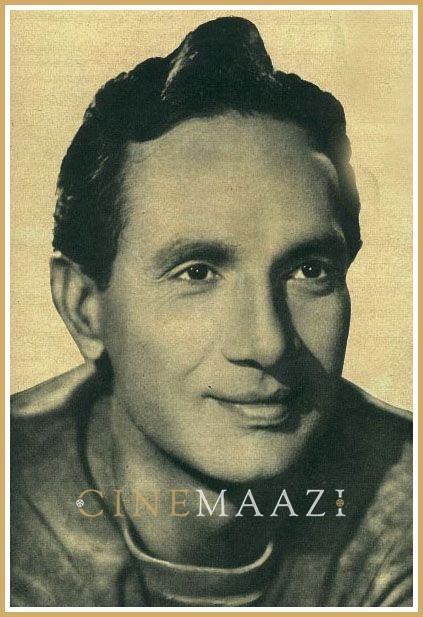
Chetan Anand
Subscribe to read full article
This section is for paid subscribers only. Our subscription is only $37/- for one full year.
You get unlimited access to all paid section and features on the website with this subscription.
Not ready for a full subscription?
You can access this article for $2, and have it saved to your account for one year.
This is not an article. Just a few notes put together. Not in any particular sequence- just as they come. Not for any kind of theorising, not for laying down rules or enunciating principles, not for any intellectual showing off or emotional outburst. Just plain notes.
The title has a question mark to it. That is as it should be. It is meant to make one ponder, think, perhaps wonder, and ask. For it is good to ask questions. How else will answers be found?
"Every director has his own individual approach to film-making, his own idea and conception of his work, his own fights and limitations".
The question then is; What is the function of a film direction.There are directors and directors. Each has his own individual approach to film-making, his own idea and conception of his work his own fights and limitations.
Since each director follows his own method, approach and aim, can there be any general theory about film direction? Is there as law guiding the film director in his work? Perhaps the only law is that there is no law. The director is low unto himself.
Every art-form has laws, principles and theories to guide the artist. Then, who and what, is a film director that he should consider himself immune, free unshackled? A very interesting, intriguing question.
A still more interesting question: Did laws and theories precede or follow works of artistic creation? Did film-making come first, or the theory of film-making.
The artist creates, then the critic formulates theories from the artist's work and expects the artist to follow those theories. Along comes another artist and tears the theories to shreds with his now work which leads to new theories by new critics.
Will the film director become one of the most significant factors among all the creative forces of this century? Asks the author...
So it goes on, the artist flying on his wings, with the critic at his heels holding him and retarding his speed, or sometimes lagging behind, blinded by the dust of the flying feet. But let's come to the film director.If directors follow no laws and each has his own individual approach, then, collectively, they must be a mass of confusion. They are. But, by this logic, so are painters and writers with their many styles, schools and "isms."
Can directors be divided into groups? Yes. Put them into four categories; (a) the happy ones (b) the frothing ones (c) the fermenting ones and (d) the rare ones.
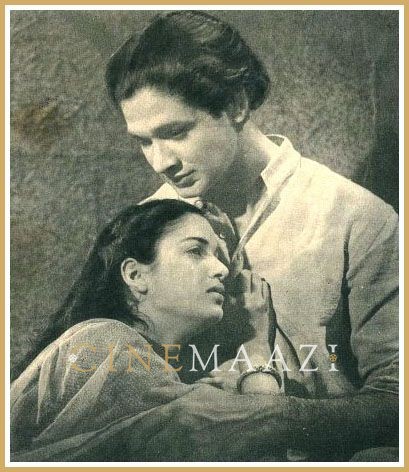
Those of category (a) live and work in a in a state of bliss. They possess the freedom to ick, steal, lift what they like and use it as they like. They have no scruples, no conscience, therefore, no troubles. They are the happy ones.
Those in category (b) are a very lively, interesting lot. They are forever frothing, bubbling, overflowing. "I did this... I did what... I am going to do such and such... Wait till I've done this and that..." It goes on endlessly. They are always full of vim. They are the ones who are all the time making and revising theories of box-office appeal. They have their sensitive fingers on the pulse of the public - they gauge public taste and set out to satisfy it by any and every means they can lay their hands on.
They are ever introducing new recipes, new permutations and combinations of the same ingredients. So many feet of humour, so many yards of romance, a handful of spices, a bagful of tricks, twists and punches, a few drops of blood, a few tears, some hip-swinging, Lata and Talaat, each thrown in thrice, shaken well and poured out in abundance with the fanfare of publicity, and there you have a hit.
The trouble is it is not always a hit. But once one of them succeeds, the rest follow the gold rush till they begin to flop over each other. Those in this category are in abundance. They go about with loudspeakers.
The third category is respectable. Fermentation is a much more serious affair than mere frothing. It is the first real stage in the process of creative achievement.
This class includes the intellectuals, the high-brows, the snobs, the super-craftsmen, those who want to be known as geniuses. To their credit are great success and dignified failures. The best, the top-most in our country belong to this clan.
Are they film creators? No. They are just film-makers. Reason? The reason is obvious. They are at best translators and interpreters of other people's work. When you see their films on the screens, you are merely seeing through their eyes what was shown to them by others before they made their films.
This kind of director merely gives you another man's view through the sleeve of his own personality. He is entirely dependent upon his writer, for he must have something to translate into celluloid. He does not say anything of his own, yet he gets the credit for saying it.
Most of these directors get box-office rewards, some get national prizes, some win international awards. Critics shower superlatives on them. Audiences make heroes of them. They win glory and renown, which they do not share with their authors.
Of course, there are good translators and bad translators. A good translator has to be somewhat of an artist himself. But is the conductor of an orchestra more important than Bach or Beethoven? Is the producer of plays more important than Shakespeare, Shaw or Ibsen? Why then does a film director resume more importance than the author he interprets andw presents on the screen? Should the translator wish for more glory than the original author? Our film director does. And, what is more, he gets it.Most of these directors get box-office rewards, some get national prizes, some win international awards. Critics shower superlatives on them. Audiences make heroes of them. They win glory and renown, which they do not share with their authors.
Such directors are also artists in their own right, no doubt. They are continually in a state of artistic fermentation, almost bringing forth, almost creating something-but never quite doing it. They are near-creators.
And the last category? To this will belong the creative directors, the film creators, the supreme ones, the rare ones, the ones that will live through posterity, the ones who will leave a stamp on their age, and perhaps, on the generation to come.
These belong to the kingdoms of poets, writers, sculptors, musicians, painters, architects, who give meaning to civilization.
Have we any of this class in our country? Ask me after two years
And now back to the question: What is the function of a film director? The answer will depend on the category you put him into. Then you can proceed to define him and his function.
Taking the last category into view may we not ague: since this century has accepted the cinema as he most dynamic and the most democratic of art-forms, also the most far-reaching in more ways than one, does it not follow that the film director should be one of the most significant factors among all the creative processes and forces of this age and this century? Does, or will, he film director attain this status?
I am merely asking. For it is good to ask questions. How else will answer be found?
This article was published in Filmfare magazine’s 7 November, 1958 edition written by Chetan Anand.
The images appeared in this feature are from the original article.
About the Author
Other Articles by Cinemaazi
17 Feb,2024
What is a Good Documentary Film?
25 Jan,2024
Salute to an Immortal Spirit
22 Jan,2024
A Painful Parting
29 Nov,2023
Children's Film Society
28 Oct,2023
Let's Give the Kids a Chance
26 Oct,2023
Directing the Child Actor
25 Oct,2023
Chandu - The Elephant Boy
23 Oct,2023
HEROISM-Children's Film Society gives the lead
18 Oct,2023
Munna
29 Sep,2023
ख्वाजा अहमद अब्बास का पत्र महात्मा गांधी के नाम
02 Sep,2023
Shakti Kapoor: It's Three Punches A Day
04 Jul,2023
Should a Filmmaker be Original?
24 Jun,2023
Babita My First Screen Love
22 Jun,2023
Phir Wohi Dil Laya Hoon
19 Jun,2023
Romance in Our Cinema
12 Jun,2023
The Romance of our Show Houses
12 Jun,2023
Kashmir Ki Kali (1964)
07 Jun,2023
Sangam (1964)
05 Jun,2023
This thing called Love
25 May,2023
Gandhi: Whose voice?
15 May,2023
"Deewar" Becomes a Nation's Prayer
15 May,2023
Mangal Pandey
06 May,2023
History of Cinema, History of the Nation
02 May,2023
Birbal Paristan Mein
20 Apr,2023
Reincarnation... the story goes on ever after
21 Mar,2023
M Sadiq
15 Mar,2023
The Social Role of the Cinema
15 Mar,2023
"Samaj" A Memorable Film with Popular Appeal
01 Mar,2023
"Two Eyes" in Hollywood
20 Feb,2023
Do Dooni Chaar
15 Feb,2023
Rafoo Chakkar
07 Feb,2023
Johnny Walker.... still going strong
20 Jan,2023
Mahabharat : Epic Tamasha
10 Jan,2023
Narsi Bhagat : An Excellent Biography
03 Jan,2023
Nav Ratri
01 Dec,2022
एक ताजगी का नाम है देवानन्द (Dev Anand)
25 Nov,2022
जे बी एच वाडिया (J B H Wadia) - वचन न जाए
14 Nov,2022
Children's Films in India
01 Sep,2022
Horses .... Cars and Laughs-Mehmood
06 Aug,2022
हिन्दी फिल्मों की दुर्दशा का जिम्मेदार कौन?
01 Aug,2022
क्या हिंदी फिल्मों से हास्य गायब हो रहा है?
20 Jul,2022
हास्य की परंपरा और हास्य अभिनेताओं की भूमिका
12 Jul,2022
प्राण और उनकी दाढ़ियाँ
17 Feb,2022
Odds Against a New Comer
10 Dec,2021
Speaking of Portraits and People
03 Nov,2021
An Actor Prepares
19 Oct,2021
Producers' War on Dubbed Films
24 Aug,2021
Jottings from a Film Director's Notebook
26 Jul,2021
प्रेमचंद सत्यजीत राय और ’सद्गति’ -गिरिजाशंकर
22 Jul,2021
Rewind 1990 Commerce of Love Stories
20 Jul,2021
Eastern Scene: Cinema of Surviving Faith
22 Jun,2021
Movie Memories : Tansen (1943)
22 Jun,2021
Movie Memories: Sikandar (1941)
15 Jun,2021
Towards A Brighter Future- Bengali Cinema
20 May,2021
The Enigma Of A Flux - Malayalam Cinema
05 May,2021
The seesaw graph of Hindi filmdom
03 May,2021
Ankahee: The Unspoken
29 Apr,2021
The Mahatma Returns: World Press Reaction
29 Apr,2021
Children’s Films
17 Apr,2021
Telugu Cinema in 1986- Sons and Fathers
09 Apr,2021
Mukhamukham : Face to Face
08 Apr,2021
Tarang : Wages and Profits
01 Apr,2021
Design In Indian Cinema
27 Mar,2021
Movie Memories : Savkari Pash
23 Mar,2021
Double Trouble: Role of Twins In Hindi Cinema
22 Mar,2021
Prem Chopra: The Same Role For Ever
19 Mar,2021
Kalyan Kumar - Karnataka’s Self-Made Star
18 Mar,2021
Ceylon's Cyclonic Cinema
18 Mar,2021
Movie Memories : Aladdin & the Wonderful Lamp
17 Mar,2021
Kumari Padmini: Rising New Star Of The South
11 Mar,2021
50 YEARS OF MALAYALAM CINEMA
02 Mar,2021
Alakh Niranjan: Film India Review
27 Feb,2021
Party: The Story of Choices
26 Feb,2021
The Naushad Era In Hindi Film Music
19 Feb,2021
A Man: Amitabh Bachchan -Amitabh, is My Name
10 Feb,2021
A Man: Amitabh Bachchan - Two of a Kind
29 Jan,2021
Women In Hindi Films : Dichotomy of Values
22 Jan,2021
A Man: Amitabh Bachchan - Yesterday and Tomorrow
22 Jan,2021
Cinema in the South: Crisis of Character
18 Jan,2021
Film Societies Play Their Part
01 Jan,2021
Nutan : A Flashback - The Actress
30 Dec,2020
"Gwalan" Proves A Thrilling Entertainment !
29 Dec,2020
Rajesh Khanna : Echoes Of An Era- Family Of Four
28 Dec,2020
Holi: A Metaphor for Horizontal Violence
23 Dec,2020
A Summon for Mohan Joshi
22 Dec,2020
Nutan : A Flashback - The Friend
22 Dec,2020
Raj Kapoor Scores Personal Triumph In “Aag”!
19 Dec,2020
Smita Patil's Memoir- Trading Places
17 Dec,2020
Shashi Kapoor: Once Upon A Time- The Film Makers
16 Dec,2020
Rajesh Khanna : Echoes Of An Era- Peer Pressures
15 Dec,2020
“Lal Haveli”- Crude But Entertaining!
12 Dec,2020
Nutan : A Flashback - The Wife
10 Dec,2020
Rajesh Khanna : Echoes Of An Era
09 Dec,2020
"Lalkar" Presents Cheap Entertainment
07 Dec,2020
Smita Patil's Memoir-Comrades In Arms
01 Dec,2020
Shashi Kapoor: Once Upon A Time- Unjinxed
28 Nov,2020
Ek Din Ka Sultan- Becomes Good Entertainer !
26 Nov,2020
Smita Patil's Memoir- Friendly Strokes
25 Nov,2020
Shashi Kapoor: Once Upon A Time- Tough Times
07 Nov,2020
The Technician And His Problems
06 Nov,2020
We Must Inject Dynamism Into Publicity
05 Nov,2020
The Role Of Film Finance Corporation
04 Nov,2020
Progress In Raw Film
30 Oct,2020
Freedom In Films
28 Oct,2020
Export Market For Indian Films
23 Oct,2020
The Growth of The Motion Picture
22 Oct,2020
Setup Of The Film Industry
21 Oct,2020
Few Facts About Film Production
13 Oct,2020
Personalisation In Cinema
08 Oct,2020
Waiting for a Doyen's Glance- Arati Bhattacharya
08 Oct,2020
कौन सुनेगा इन सिसकती बिलखती प्रतिभाओं का विलाप?
06 Oct,2020
Asrani - Laugh And The World Laughs With You
05 Oct,2020
My Memorable Roles- Hiralal
03 Oct,2020
राजीव गोस्वामी - कहां थे अब तक 'पेंटर बाबू'?
03 Oct,2020
जब नफरत से बेड़ा पार हो गया: बलराज साहनी
30 Sep,2020
The Case of Emotional Turmoil In Dopatta (1952)
29 Sep,2020
The Story Of A Child Artiste - Sheela Kashimiri
26 Sep,2020
Afsana Likh Rahi Hoon : Tun Tun
26 Sep,2020
Some Hopes For The New Year: Lillian
24 Sep,2020
Joru Ka Bhai: A Tale of 'Atithi Tum Kab Jaoge'
22 Sep,2020
अभिनेता प्रेमअदीब से भेंट
21 Sep,2020
Vijaylaxmi: A Career As The 'Other' Woman
18 Sep,2020
Shaminder: The Actor Who Had High Hopes
16 Sep,2020
धर्मेन्द्र - समय आ रहा है...
14 Sep,2020
Film Life After Fifty : Motilal
14 Sep,2020
प्रसिद्ध फिल्म लेखक गुलशन नंदा से आपकी बातचीत
11 Sep,2020
"I live on hope"- Kumkum
11 Sep,2020
Thehr Zara O Jane Wale : Madhubala Jhaveri
09 Sep,2020
Ratnamala Attracts Attention In ‘Station Master’
08 Sep,2020
Ghory: The Laurel Of Indian Cinema's Comedy Duo
07 Sep,2020
Yeh Teri Saadgi, Yeh Tera Baankpan: Usha Khanna
07 Sep,2020
सेनापति शेट्टी
05 Sep,2020
कृतिदेव यहां मैं, तनूजा, स्वीकार करती हूँ
05 Sep,2020
मै उर्मिला को भूल नहीं पाती - मंजरी
04 Sep,2020
बुलबुल बंगाल की: चंद्राणी मुखर्जी
03 Sep,2020
Payyal's Lucky Break
02 Sep,2020
These Foreign Producers
29 Aug,2020
The Practical Actress: Shabnam
29 Aug,2020
“Amrit” Becomes A First Class Picture
28 Aug,2020
फिल्मी मारपीट के गुरू : अजीम भाई
26 Aug,2020
From Poverty to Screen Fame - Mehboob Khan
26 Aug,2020
Humility: Nasreen's Most Admirable Feature
24 Aug,2020
A Mercenary Comes To India - Bob Christo
23 Aug,2020
Dilip Kumar: The Leader
19 Aug,2020
Alam Ara: Ardeshir Irani's Ambitious Secret
17 Aug,2020
I Serve My Art- Kanan Devi
10 Jul,2020



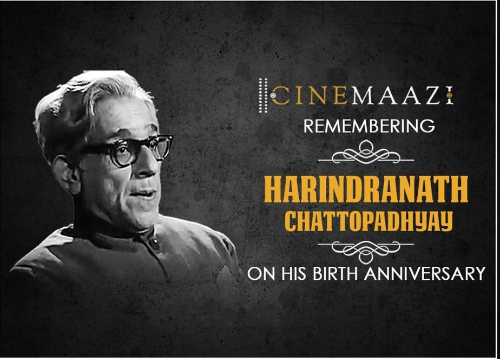
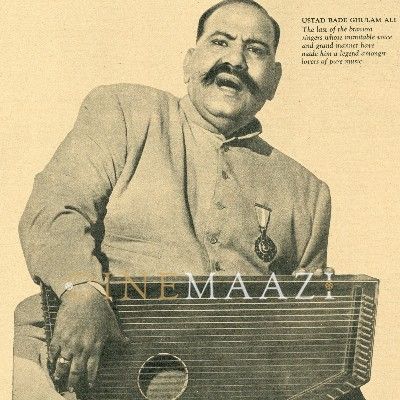
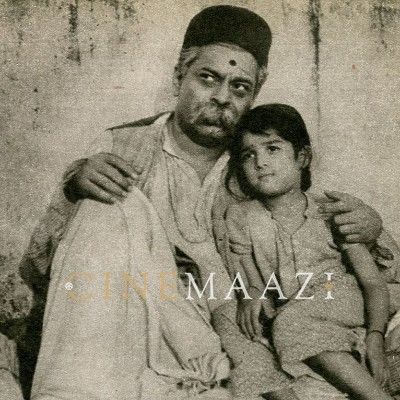
.jpg)


